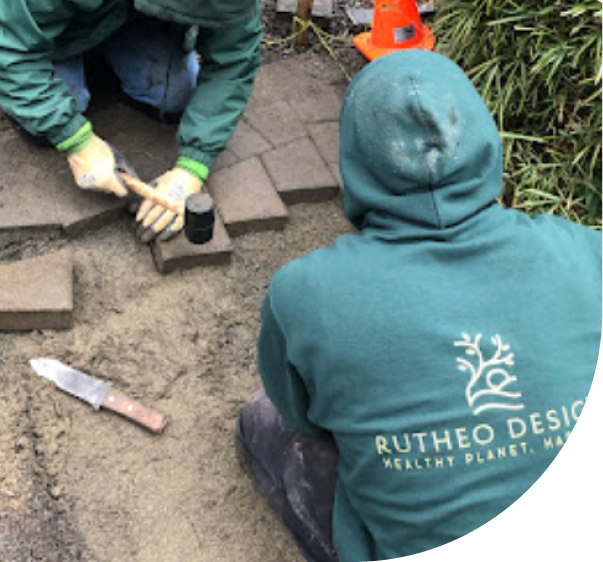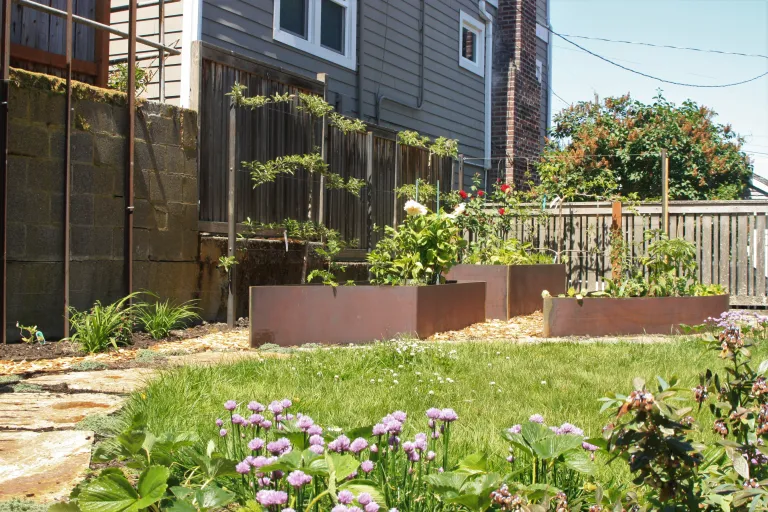
At Rutheo Designs, we create custom raised garden beds that blend functionality, sustainability, and aesthetic appeal—perfect for Seattle’s unique climate and soil conditions. Raised beds improve drainage, prevent soil compaction, and allow for precise control over soil composition, making them an excellent choice for organic vegetable gardens, native plant landscapes, and pollinator-friendly spaces. Our team prioritizes the use of sustainable materials like untreated cedar, recycled composite lumber, and natural stone to ensure longevity without compromising environmental integrity. Whether integrating raised beds into an edible landscape, therapeutic garden, or small urban space, we design with both beauty and practicality in mind, ensuring that each installation is accessible, easy to maintain, and built for long-term resilience.
One of the greatest advantages of raised garden beds is the ability to create and maintain high-quality soil. Traditional in-ground gardening is often limited by native soil conditions, which may be too compacted, sandy, or clay-heavy for optimal plant growth. Raised beds allow for a custom soil blend tailored to specific plant needs.
Raised beds improve water drainage, preventing issues like root rot caused by excess moisture. The controlled soil structure ensures that water flows efficiently, providing healthier root systems. Gardeners can introduce a nutrient-rich mixture of organic matter, compost, and aeration materials like perlite or sand, optimizing conditions for plant growth. Since raised beds are contained structures, they minimize foot traffic over the soil, reducing compaction. This leads to better root development and less erosion caused by wind and rain.
Raised garden beds provide ergonomic benefits, making gardening more accessible and enjoyable for individuals of all ages and mobility levels.
Elevated designs mean less bending and kneeling, reducing back and joint strain, especially for aging gardeners. They can also be customized for wheelchair users by adjusting the height and width, ensuring accessibility for everyone. With compact and organized growing spaces, raised beds make weeding, planting, and harvesting more efficient.
Raised garden beds align with sustainable gardening principles by promoting water conservation, recycling materials, and fostering biodiversity.
Implementing drip irrigation systems in raised beds minimizes water waste by delivering hydration directly to the roots. Using reclaimed and sustainable materials like cedar, recycled composite wood, and stone supports long-term environmental responsibility. Additionally, incorporating pollinator-friendly plants within raised beds encourages biodiversity and provides essential habitats for beneficial insects like bees and butterflies.
Raised beds contribute to therapeutic garden spaces by offering engaging sensory experiences and promoting relaxation.
Selecting plants with diverse fragrances and textures enhances the sensory appeal of a healing garden. Lavender, chamomile, and lemongrass provide soothing scents, while plants like lamb’s ear and ornamental grasses add tactile variety. Designing raised beds for therapeutic engagement includes creating structured pathways, ensuring accessibility, and incorporating seating for relaxation and observation.
Interactive features such as water elements, wind chimes, and edible plants encourage engagement and create a calming environment suitable for stress relief and mental well-being.
Accessibility considerations ensure that raised garden beds are usable for individuals with mobility challenges.
Custom heights allow for gardening without excessive bending or kneeling, making the experience more comfortable. Raised beds can be adapted for wheelchair users by ensuring proper clearance and positioning. Adaptive tools, including long-handled trowels and ergonomic pruners, enhance ease of use. Thoughtfully designed pathways with smooth surfaces and adequate space for movement make navigating the garden seamless and enjoyable for all gardeners.
Seasonal care is essential for maintaining the health and productivity of raised garden beds. Each season requires specific maintenance tasks to ensure optimal plant growth and soil quality.
In spring, soil enrichment and preparation are key. Adding compost, organic matter, and balanced nutrients replenishes the soil after winter dormancy. Early planting of cool-season crops such as lettuce, spinach, and peas takes advantage of mild temperatures.
Summer brings challenges such as heat stress and moisture retention. Using mulch helps regulate soil temperature and retain moisture, while drip irrigation ensures efficient water use. Providing shade for delicate plants during peak heat prevents sun damage and bolsters growth.
As fall approaches, mulching and covering beds protect soil from erosion and nutrient loss. Planting cover crops like clover or rye enriches the soil and prevents weeds from taking hold. Winter protection, such as row covers or cold frames, extends the growing season and shields perennial plants from harsh conditions.
A proactive approach to pest and weed management ensures healthier plants and reduces reliance on synthetic chemicals.
Organic pest control solutions, including neem oil, insecticidal soaps, and beneficial insects like ladybugs, help keep common garden pests at bay. Companion planting enhances natural pest deterrence by pairing plants that repel insects—marigolds, for example, deter aphids, while basil discourages mosquitoes and flies.
Strategic planting and mulching serve as effective weed prevention measures. Dense planting minimizes open soil, reducing space for weeds to grow, while a thick layer of mulch blocks sunlight and suppresses weed germination.

At Rutheo Designs, we are dedicated to transforming your outdoor spaces into beautiful, sustainable landscapes that reflect your vision and the unique character of the Seattle area. Whether you’re looking to enhance your garden with native plants, need expert advice on water-efficient irrigation systems, want to explore custom hardscaping for your outdoor living space, or discuss a comprehensive landscape design, our team is here to assist you every step of the way. We offer services in native plant landscaping, water-efficient irrigation, custom landscape design, and hardscaping solutions tailored to your goals and the local environment. Every project is unique, and we take the time to listen to your needs and offer personalized solutions that align with both your aspirations and Seattle’s natural surroundings.
We invite you to reach out to us to start the conversation about your landscaping needs. You can contact us by email at connect@rutheodesigns.com or give us a call at (360) 844-2989. Whether you have specific questions or are ready to schedule a consultation, we’re eager to help you bring your outdoor vision to life with the care and expertise that Rutheo Designs is known for.